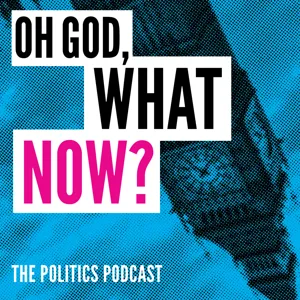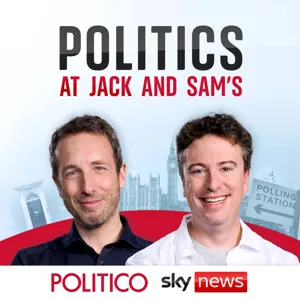Podcast Summary
By-elections in Kingswood and Wellingborough result in historic losses for Conservatives: In the recent by-elections, Labour made significant gains in previously Conservative seats, marking a notable shift in political dynamics
The recent by-elections in Kingswood and Wellingborough, both previously Conservative seats, saw historic losses for the Tories, with Labour taking the seats. Michelle Norris, host of the "Your Mom's Kitchen" podcast, shared her experience of renting an Airbnb with a great kitchen while traveling and emphasized the potential value of home-sharing. Meanwhile, Anoushia Kelly, written editor at The New Statesman and podcast host, discussed the by-election results with Rachel Cunliffe, associate political editor, and Ben Walker, senior data journalist. Wellingborough, a former seat of suspended Conservative MP Peter Bone, saw a significant swing to Labour, while Kingswood, previously held by Chris Skidmore who resigned over net zero targets, also fell to Labour. The elections marked a notable shift in political dynamics, with decent majorities being overturned in both seats.
By-elections in Kingswood and Wellingborough reveal shifting voter behavior: Labour gains impressively in Kingswood and Wellingborough by-elections, while Conservatives experience losses. Reform vote emerges as a potential factor, posing opportunities and challenges for the Tories. Local circumstances may also influence results.
The by-elections in Kingswood and Wellingborough have shown significant shifts in voter behavior, with Labour making impressive gains and the Conservative Party experiencing significant losses. The reform vote, which has long been seen as a phantom voter, seems to be materializing for the first time, potentially posing both opportunities and challenges for the Conservatives. The results in these two constituencies align with polling data, suggesting a potential Labor landslide if these trends continue nationally. However, it's important to note that these results may also be influenced by local circumstances, such as the Conservative candidate in Wellingborough being Peter Bone's partner. Overall, these by-elections underscore the volatility of the political landscape and the importance of local campaigning.
Wellingborough by-election: Conservative campaign lacked effort and local connection: Historically safe Tory seat saw Labour opportunity due to voter dissatisfaction with incumbent MP and lackluster campaign effort.
The lackluster Conservative campaign in the Wellingborough by-election was likely due to voter dissatisfaction with incumbent MP Peter Bone and his perceived lack of advocacy for the constituency. The absence of campaign activity from the Conservative side, including the dilapidated campaign office, further reinforced this perception. Despite being a historically safe Tory seat, the Labour campaign saw an opportunity due to local discontent, while the Conservatives seemed to have given up before the race even began. The candidate selection of Helen Harrison, a local councilor, was met with speculation regarding her connection to Peter Bone, but the Conservative campaign denied any ulterior motives. Overall, the by-election in Wellingborough served as a reminder of the importance of effective campaigning and representation in maintaining voter support.
Labour's win in Filton and Bradley Stoke despite boundary change and temporary candidate: Labour's firm stance on house building and ignoring local opposition didn't harm them in the Filton and Bradley Stoke by-election, suggesting they're on track to win classic swing seats despite polls and high-profile issues.
The recent by-election win for Labour in Filton and Bradley Stoke, a suburban seat in South Gloucestershire, was significant despite the seat disappearing in a boundary review and the candidate, Damien Egan, only serving temporarily before running for a different seat. The Tory candidate ran a one-issue campaign on protecting the green belt, but Labour, under Keir Starmer's leadership, maintained a firm stance on house building and ignored local opposition, which did not seem to damage them in the election. This result suggests that Labour is on track to win in classic swing seats, despite polls indicating otherwise following high-profile issues and a U-turn on policy. The lack of visibility or engagement from the Tory campaign also played a role in Labour's victory.
Reform UK making progress in local elections: Reform UK's 10-13% performance in local elections aligns with national polling, but its voters may not all return to Tories, causing concern for the Conservatives.
Reform UK, formerly the Brexit Party, is making progress in local elections, securing 10% of the votes in Kingswood and 13% in Wellingborough. This performance is significant because it aligns with national polling, which places Reform UK around 9-10% in popularity. However, this does not guarantee more seats than the Liberal Democrats, as past elections have shown that Reform UK's voters are not just disgruntled Tories but also those looking to shake up the political system. This trend, reminiscent of UKIP's rise, could mean that Reform UK's voters may turn out in greater numbers during a general election. The shift in voter behavior from Tory to Reform UK and Labour is a cause for concern for the Conservatives, as these defectors are less likely to return to the Tory fold compared to those who become apathetic or indifferent. The size of the apathetic voter base has grown, and while the Tories believe they can rally these voters back, the current trend suggests that many have found new homes with Labour and Reform UK.
Reform Party's third place finish in Wellingborough raises concerns for Conservatives: The Reform Party's unexpected showing in a traditionally conservative, high leave voting area highlights a shift in political dynamics, with voters switching from Conservatives and Labour, and the Labour Party appealing to traditional Conservative voters.
The Reform Party's success in the Wellingborough by-election, despite only coming in third place, is a cause for concern for the Conservative Party. Reform's showing was particularly significant in this constituency due to its high leave voting history and UKIP's strong performance in 2015. The party's ability to maintain momentum and attract voters from both the Conservatives and Labour is noteworthy. The low turnout in the election did not stop some Conservative voters from switching to Reform or Labour, demonstrating a shift in political dynamics. The Labour Party's success in appealing to traditional Conservative voters directly is a worrying sign for the Conservatives, as it challenges the notion that certain areas are unwinnable for Labour. The Conservative Party's right-wing faction, which has been advocating for a more hardline stance on immigration, Brexit, and being "anti-woke," may need to reconsider their strategy as this approach does not seem to be enough to win back Reform voters. The change in reception towards the Labour Party on the campaign trail in just a few years is a clear indication of the shifting political landscape.
UK Political Landscape: Complex and Nuanced: Despite a close lead, the Reform Party's impact on Conservative votes is uncertain due to various factors, including voter disillusionment, protest votes, and societal concerns.
The recent political landscape in the UK is complex and nuanced, particularly in constituencies where the Conservative Party is being squeezed between the Reform Party and Labour. The Reform Party's lead isn't large enough to guarantee a clear win for the Conservatives, as some voters would have gone to Labour regardless, some wouldn't vote at all, and some might have cast protest votes for other parties. Disillusionment with the Conservative government, particularly regarding Partygate and the state of public services and neighborhoods, remains a significant factor. The ongoing issues in Rochdale, where Labour had to disown candidates due to controversial remarks, further complicates the situation. Ultimately, the political landscape is shaped by a combination of emotional and personal factors, as well as broader societal concerns.
Labour Party issues not significantly impacting broader politics: Despite Labour's internal controversies, the British public shows little interest and the party's relationship with Muslim voters is a concern, but political promises and cynicism towards parties may lead to inevitable u-turns.
The ongoing issues within the Labour Party, including the controversy surrounding anti-Semitism and the £28,000,000,000 green investment pledge, have not significantly affected the national political landscape. The British public, by and large, have shown little interest in these matters. However, there are serious concerns about Labour's relationship with Muslim voters, as indicated by a significant drop in support in a recent poll. Additionally, the lack of enthusiasm for political parties and politicians, as well as the cynicism towards political promises, suggests that u-turns on major budget commitments may be an inevitable part of the political process. These factors could potentially impact Labour's performance in upcoming elections, particularly in Muslim constituencies. Overall, the focus on internal party issues may be dominating the discourse, but it may not have significant implications for the broader political landscape.
Addressing voter cynicism and financial constraints now is better than later: Politicians believe it's more effective to tackle budget cuts and voter skepticism now rather than waiting to gain power and risk broken promises
Local politicians believe it's better to raise taxes and address voter cynicism now rather than later. During a recent discussion, it was acknowledged that voters are already feeling the financial squeeze and are more likely to understand budget cuts. This was evident in the recent by-election results in Kingswood, where the Labour MP admitted that the topic of tax increases had come up during campaigning. Despite the Greens gaining support in the area due to their focus on green industrial jobs, Labour's stance on not making promises they can't keep resonated with some voters. This approach allows politicians to turn big budget commitments into aspirations, as voters have come to expect budget cuts. This strategy was also seen as preferable to waiting until gaining power and then dropping promises, as Labour's spin suggested. Overall, the consensus was that addressing voter cynicism and financial constraints now is a more effective approach than delaying these tough decisions.
Affordable jet-setting essentials from Quinn's: Quinn's provides high-quality European linen, premium luggage, and Italian leather bags at 50-80% less than similar brands, with ethical and safe manufacturing practices.
Quinn's offers high-quality, jet-setting essentials at affordable prices, with European linen, premium luggage, and buttery soft Italian leather bags all priced at 50 to 80% less than similar brands. Additionally, Quinn's commitment to ethical and safe manufacturing practices adds an extra layer of value to your purchase. Whether you're packing for a vacation now or preparing for future trips, Quince's offerings are worth considering. And with free shipping and 365-day returns, there's no risk in trying them out for yourself. So, if you're looking to upgrade your travel wardrobe without breaking the bank, head to quints.com/pack.




